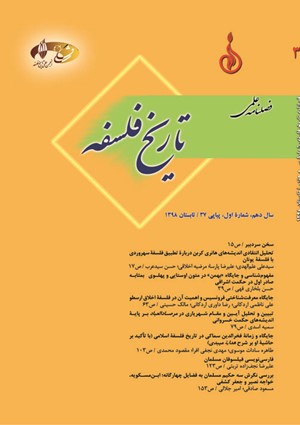تحلیل انتقادی اندیشههای هانری کربن دربارة تطبیق فلسفة سهروردی با فلسفة یونان
محورهای موضوعی : Connection of philosophers’ views and philosophical schools with the social and philosophical conditions of the timeحسن سیدعرب 1 * , سیّد علی علم الهدی 2 , علیرضا پارسا 3 , مرضیه اخلاقی 4
1 - دانشگاه پیام نور
2 - دانشگاه پیام نور
3 - دانشگاه پیام نور
4 - دانشگاه پیام نور
کلید واژه: کربن سهروردی فلسفه یونان افلاطون ارسطو نوافلاطونیان مسیحیت فلسفة تطبیقی,
چکیده مقاله :
هانری کربن، مفسر غربی فلسفة اشراق سهروردی است. اندیشة او در تفسیر این فلسفه مبتنی بر تأویل، پدیدارشناسی، نظریة فراتاریخ و فلسفة تطبیقی است. نوشتار حاضر نخستین نوشتاری است که به این موضوع پرداخته و هدف آن بررسی انتقادی اندیشههای كربن دربارة تطبیق فلسفة سهروردی با فلسفة افلاطون، ارسطو و نوافلاطونیان است. این مقاله به نوآوریهای سهروردی پرداخته است تا بدينوسيله وجه تمایز اندیشة او از آن فیلسوفان بيان گردد. در نتیجهگیری نیز پس از جمعبندی مطالب، نقدی کلی به روششناسی کربن و کاستیهای آن مطرح شده است. فلسفة تطبیقی ـ که گاه فلسفة بینافرهنگی نیز نامیده میشودـ رشتهيی از مطالعات فلسفی است که در خلال آن فیلسوفان با نظر به مبانی اندیشة فلاسفه از جریانهای فرهنگی، زبانی و فلسفی متفاوت، به مسائل فلسفی میپردازند و اختلاف و اشتراک آراء آنان را مطالعه میکنند. بعقيدة کربن، فلسفة تطبیقی راهگشای درک صحیح تفکر در تاریخ فلسفه است و او بر این مبنا فلسفة اشراق را با افلاطون و ارسطو تطبیق داده است. بنظر وی این فلسفه برگرفته از دیدگاههای افلاطون است. این وجه نظر مسبوق به اصالت فلسفه در یونان نزد اوست. کربن سهروردی را افلاطون جهان اسلام دانسته است. دیدگاه کربن نوآوریهای سهروردی و تفاوت اندیشة او با افلاطون و نیز انتقاد وی به ارسطو را نادیده میگیرد.
Henry Corbin is a western commentator of Suhrawardī’s Illuminationist philosophy. His thoughts in relation to interpreting this philosophy are based on t’awīl (hermeneutics), phenomenology, metahistory, and comparative philosophy. The present paper is the first attempt at addressing this subject, and it is intended to critically investigate Corbin’s thoughts regarding the comparison of Suhrawardī’s philosophy with those of Plato, Aristotle, and neo-Platonists. Here, the authors have explored Suhrawardī’s innovative ideas so that the differences between them and the thoughts of the above-mentioned philosophers are disclosed. They have also presented a general critique of Corbin’s methodology and its defects in the conclusion. Comparative philosophy, which is sometimes called intercultural philosophy, requires philosophers to deal with various cultural, linguistic, and philosophical trends with an emphasis on the fundamental principles underlying the philosophers’ thoughts and to study the differences and similarities among their views. In Corbin’s view, comparative philosophy has functioned as the gateway of the correct perception of philosophical thoughts in the history of philosophy, and that is why he has compared Illuminationist philosophy with the philosophical views of Plato and Aristotle. He believes that Suhrawardī’s philosophy has been derived from Plato’s views, which seems to have its roots in his idea that the origin of philosophy is Greece. Corbin considers him as the Plato of the world of Islam; however, he ignores Suhrawardī’s innovations, the differences between his philosophy and that of Plato, and his criticism of Aristotle.
قرآن کریم.
سهروردي (1377) هياکل النور، قدّم له و حقق نصوصه مع تعليقات محمّد علي ابوريان، مصر: المکتبة التجارية الکبري.
سهروردي (1427ق) التنقيحات في اصول الفقه، حقّقه و قدّم له و علّق عليه عياض بن نامي السلمي، رياض: مکتبة الرشد.
سهروردي (1380) مجموعه مصنفات شيخ اشراق، تصحيح و مقدمه هانري كربن و ديگران، تهران: پژوهشگاه علوم انساني و مطالعات فرهنگي.
Corbin, H. (1954). Avicenne et le recit visionnaire. Tehran: Societ Des Mohuments Nationaux. Corbin, H. (1964). Histoire de la philosophie islamique. Paris: Gallimard.
Corbin, H. (1969). Creative imagination in the Sufism of Ibn Arabi, R. Manheim, (translated from French) Princeton: Princeton University Press.
Corbin, H. (1971). En Islam Iranien aspects spirituels et philosophiques (Vols. 1-2). France: Gallimard.
Corbin, H. (1979). Corps spirituel et terre céleste, De Ľiran Mazdeen a L’Iran Shi’ite. Paris: Buchet/Chastel.
Corbin, H. (1981a). De Heidegger à Sohravardî., Christian Jambet (ed.), Paris, I’Herne, 23-37.
Corbin, H. (1981b). Post- scriptum biographique à un Entretien philosophique, Christian Jambet (ed.), Paris: L’ Herne. 38-56.
Corbin, H. (1982). Le Livre des penetration metaphysiques. Tehran: Tahuri.
Corbin, H. (1983). Cyclical time and Ismaili gnosis. London, Boston: Kegan Paul International in Association with Islamic Publications Ltd.
Corbin, H. (1993). Itineraire dun enseignement. Tehran: Institut Fracais De Recherche Iran.
Corbin, H. (2012). Les motifs Zoroastriens dans la philosophie de Sohrawardi. Tehran: Iranian Linstitute of Philosophy.
Corbin, H. (1977). Philosophie Iranienne et philosophie comparée, Paris: Buchet/Chastel.
Shayegan, D. (1990). Henry Corbin: La topographie spirituelle de l’islam iranien. Paris. Editions de la difference.

